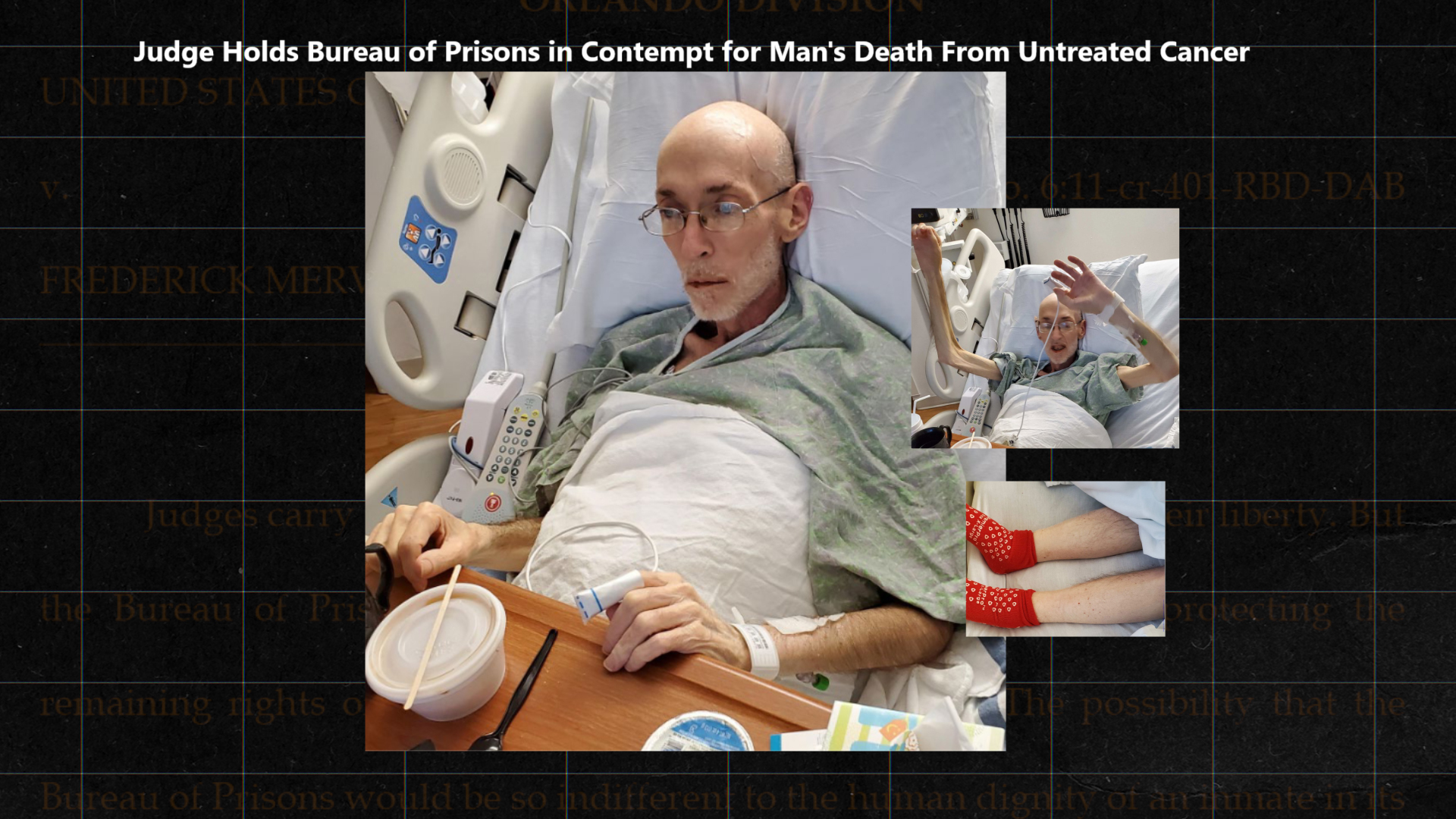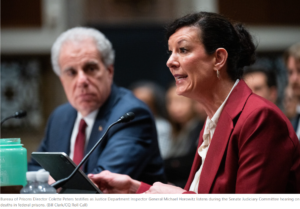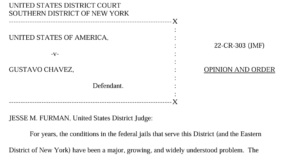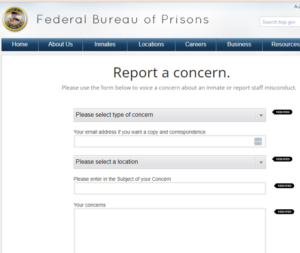WHAT TO DO WHEN MEDICAL CARE IS NOT PROVIDED
1st COMPREHENSIVE PREPARATION OF YOUR MEDICAL FILE FOR YOUR PRESENTENCE INTERVIEW, 2nd LEARN THE ADMINISTRATIVE REMEDY PROCESS
ALONG WITH
TOOLS FOR YOUR FAMILY AND COUNSEL TO ADVOCATE ON YOUR BEHALF FROM HOME
TOPICS
I) OIG AND BOP DIRECTOR PETERS TESTIFY BEFORE THE US SENATE
II) HEALTHCARE DELAYED: RECENT EXAMPLES
III) PREPARATION: WHAT YOU CAN DO
IV) HOW THE BOP CLASSIFIES DEATH: NATURAL OR SUSPICIOUS, NOW QUESTIONED.
I) OIG AND BOP DIRECTOR PETERS TESTIFY BEFORE THE US SENATE
OIG INSPECTOR AND BOP DIRECTOR, BEFORE THE U.S. SENATE 2/28/2024,
Statement of Michael E. Horowitz Inspector General, U.S. Department of Justice, before the U.S. Senate Committee on the Judiciary concerning Examining and Preventing Deaths of Incarcerated Individuals in Federal Prisons
Results of the Evaluation
- Suicide Represents a Significant Risk Area for BOP, Which the BOP Can Help Mitigate through Compliance with Existing Policies
- The BOP’s Response to Medical Emergencies Was Often Insufficient Due to Lack of Clear Communication, Urgency, or Proper Equipment
- A Lack of Available Information About Inmate Deaths Limit the BOP’s Ability to Potentially Prevent Future Inmate Deaths
- Long-standing Operational Challenges, Such as Contraband Interdiction, Further Impair the BOP’s Ability to Reduce the Risk of Inmate Deaths
Federal Prison Director tells senators about staffing ‘crisis.’
- Senators focused on chronic staffing issues in the federal Bureau of Prisons on Wednesday. The agency’s head stated that the system is experiencing a “crisis” in recruiting and retaining employees.
- A recent watchdog report highlighted long-standing staffing shortages and systemic failures that have led to numerous prisoner deaths over the years.
Judge Furman, Page 18 Cit 20: see id. at 6 (arguing that the outside receiver should be given authority to, among other things, “more efficiently assign and deploy uniformed staff to maximize coverage in housing areas” and “hire and promote staff so that there are a sufficient number of qualified and experienced individuals to fill supervisory and other uniformed positions”).
II) HEALTHCARE DELAYED: RECENT EXAMPLES
First, One defendant who kept a log of these lockdowns recently reported that he had been “locked down for 137 of [the] 245 days” he was detained at the MDC, or “more than 50% of his time…
Second, the MDC is notoriously and, in some instances, egregiously slow in providing necessary medical and mental health treatment to inmates — especially where such care requires the attention of outside providers… Ongoing staffing shortages have not been isolated to MDC Brooklyn but have plagued the entire BOP, with nurses, teachers, and other non-correction-trained officers subbed into those duties. JESSE M. FURMAN, United States District Judge
1. Two years and counting. Inmate says medical delays still plague federal prison in Sheridan, Oregon, Jaclyn Diaz, Sep 1, 2024
His symptoms began in 2022 at a different facility which consisted of severe abdominal pains, bloody bowel movements, and a swollen abdomen. His stomach on the right side is painful and sticks out like a grapefruit.
- In 2022, while in Idaho, he underwent a colonoscopy, during which two polyps were removed.
- Next, he was moved to SeaTac in Seattle and then to the federal facility in Sheridan, Oregon. Still, he hasn’t seen his biopsy results or doctors to review the res or treatment plan, if any.
- “Nobody can tell me there isn’t something wrong with me.”
Thornhill claims that prison officers made the experience as uncomfortable as possible serving them frozen meals without warming them up to discourage them to discourage prisoners from wanting to undergo the process again. He believes this was done to reduce the official number of X-ray requests. Thornhill never signed the forms and still has not received an X-ray after a couple of months.
- On Thursday, July 25, 2024, the President signed H.R. 3019, the “Federal Prison Oversight Act,” into law. This act establishes an inspection regime for the Bureau of Prisons and an Ombudsman office in the Department of Justice.
- 1 in 4 inmate deaths happens in the same federal prison. Why?
2. Medical Delays in Prison Cause Preventable Deaths, Sep 4, 2024, Jaclyn Diaz
-
The Human Cost of Medical Delays in Prison
“We’re talking about something I’ve been dealing with for a year. I’ve been suffering for the last year. And I’ve been begging them to treat me for this,” he says. “Nobody can tell me there isn’t something wrong with me.”
I expected this response from the Bureau of Prisons.’ Why? If the BOP were a hospital or extensive medical practice, its lawyers would have coached their staff to say nothing and wait for that court order.
“For privacy, safety, and security reasons, we do not discuss any individuals’ conditions of confinement, to include health status or medical treatment plans.” Appears Written by Lawyers…
Wayne Lankhaar Was Lucky, Yes, even with a Cancer Diagnosis.
- But he was persistent and found out.
- Yet no matter how hard he tried, Lankhaar, incarcerated at the federal detention center in SeaTac, couldn’t see a doctor.
- His lawyer, David Hammerstad, emailed officials four times.
- Mr Hammerstad did a great job pushing the right buttons.
- The institution’s “indifference” to Lankhaar’s medical needs was “courting legal liability.”
- After two months and a court order, he was released to a drug treatment center, where he collapsed, was taken to the emergency room, and finally was diagnosed with terminal colon cancer that had spread to his lungs.
Like state and county governments maintaining jails and prisons, the federal government is legally responsible for the health care of people in its custody. Violations of that duty can be deemed “cruel and unusual punishment” and, therefore, unconstitutional.
AGAIN, NOT SURPRISED,
The Federal Bureau of Prisons declined an interview but said in a statement that all of its facilities provide – everything. Ok…
“essential medical, dental, and mental health services in a manner consistent with accepted community standards for a correctional environment.”
U.S. District Judge Roy Dalton for the Middle District of Florida wrote that the BOP should be “deeply ashamed” of how it treated the now-deceased inmate Frederick Bardell and held the Federal Bureau of Prisons in Contempt, 2022.
III) PREPARATION: WHAT ‘YOU’ CAN DO
1st COMPREHENSIVE PREPARATION FOR YOUR PRESENTENCE INTERVIEW, 2nd THE ADMINISTRATIVE REMEDY PROCESS
WITH
TOOLS YOUR FAMILY AND COUNSEL CAN FOLLOW FROM HOME
Fighting For Your Healthcare – Your Right To Live
The ADMINISTRATIVE REMEDY PROCESS: BP 8-11, §2241, §2255
he ADMINISTRATIVE REMEDY PROCESS: BP 8-11, §2241, §2255″
PART A)
- THE BOP ENCOURAGES AIC* TAKE THESE ACTION STEPS (SUMMARY FORM AND FLOW CHART) FOR ALL GRIEVANCES.
*AIC: ADULTS IN CUSTODY
PART B)
PART C)
- KEEP IN MIND, LIKE EVERYTHING, THERE ARE NO PROMISES OR GUARANTEES.
- STILL, ACTION IS NECESSARY BECAUSE DOING NOTHING PROMISES A DEFINITE OUTCOME.
The SEICHE CENTER FOR ‘HEALTH AND JUSTICE’
- Between Yale’s School of Medicine and Law School, “My dad was ill. Could he survive the prison healthcare system?”
We Know When:
-
Family members stay engaged, like when kids are still close to their moms or dads who are incarcerated,
-
When there is a family support system when people return home or even when they’re inside, that
-
That the health of the incarcerated person is better,”–Professor Emily Wang, MD, MAS.
-
Legal Representation is also an important component.
IV) HOW THE BOP CLASSIFIES DEATH: NATURAL OR SUSPICIOUS, NOW QUESTIONED
How Does The BOP Classify Death, Natural or Suspicious?
- How or why can an autopsy or mortality report be hidden?
- To Keep From Embarrassing Prison Officials?
- Strange? Right?
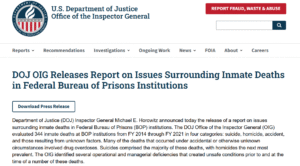
Records showed that staff ignored one incarcerated woman’s pleas for help for eight months while she steadily lost the ability to walk. Staff advised her to take Motrin for excruciating pain and delayed and denied a CT scan that would have revealed the source of her torment: bone cancer.
She died in a prison transport van on the way to a local hospital to see an oncologist.
The court’s deference to the BOP’s arguments relies on the assumption that the BOP is making a good-faith effort to improve its healthcare services and not cover up neglect and malpractice.
In 2022, a different federal judge held the BOP in civil contempt and levied sanctions.


